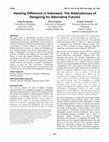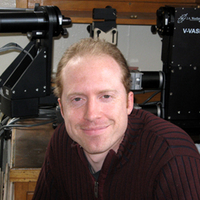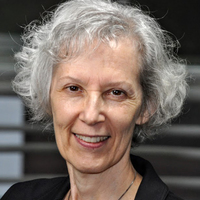Papers by Stefanie Wuschitz
Social Science Research Network, 2023

Feminist Theory, Mar 29, 2022
Makerspaces and hacklabs are believed to encourage a positive attitude towards gaining computer s... more Makerspaces and hacklabs are believed to encourage a positive attitude towards gaining computer skills. Within these communities for peer production, citizens can apply cutting-edge technologies in DIY projects. In recent decades, mushrooming makerspaces and hacklabs were embraced by the tech industry and governments alike. Feminist makerspaces and hacklabs, however, as they are centred around a queer feminist agenda, have raised eyebrows. In order to foster diversity in tech development, they create safer spaces for self-expression. Here, feminist lay(wo)men* (To emphasise that the category ‘Woman’ is constructed and that more people than only those who identify as women are being included, one uses the sign * after the term ‘women’ ), makers, designers, artists and tinkerers experiment with open-source hardware and software. Art and design projects emerging from feminist hacklabs focus on issues of representation and democratic participation in digital media, as well as on ways of reclaiming one’s own body. This article tries to unpack how, after an exhibition on sexual health norms, a feminist hacklab was attacked by local right-wing and conservative politicians. The attack resulted in the defunding of the feminist hacklab. But it also started a transformation process within the collective, as members became aware of critical interferences of diffracting marginalisations. The crisis triggered a discussion on how each member was threatened to very different degrees; for example, there was more at stake for members depending on their legal status in the country. The right-wing and conservative campaign against the feminist hacklab damaged the initiative, but at the same time it pushed the collective to generate increased vehemence and resilience.

The paper offers an ethnographic account of racial and cultural difference as sites to contest do... more The paper offers an ethnographic account of racial and cultural difference as sites to contest dominant practices of computing and technology. Specifically, we focus on how a collective of Indonesian biohackers position the care labor of a generation of women (referred to as Nenek-nenek in Bahasa Indonesia) to retrace the origins and boundaries of their making, hacking, and citizen science practices. The paper's contribution is to bring the study of the political economy of hacking and making into conversation with themes of racial and cultural difference in postcolonial computing across HCI, STS, and design. More specifically, the paper examines how Indonesian biohackers position situated histories and expertise as properly technological. Further, we show how their articulation of Indonesian difference was in turn appropriated by foreign hackers and commentators to envision tech futures against the status quo.
transcript Verlag eBooks, Dec 31, 2014
CHI Conference on Human Factors in Computing Systems Extended Abstracts, Apr 27, 2022
Electronic Workshops in Computing
Interferences of the Multitude is an introductory analysis of the perspectives collected under th... more Interferences of the Multitude is an introductory analysis of the perspectives collected under the umbrella of the homonymous track, presented during the Rogue Research edition of the 3rd Politics of the Machines Conference in Berlin (September 14–17, 2021). The paper examines the implementation of arts-based research into the new modes of techno-ecofeminist imaginaries and investigates its generative potential for the enactment of the new materialist and feminist ethics of care, collaboration, and solidarity. The projects presented and discussed span the entangled fields of human–computer interaction, computer-supported cooperative work, material sciences, critical design and making, architecture, machine learning, interactive art, and post-human performance.
Electronic Workshops in Computing

Feminist Theory
Makerspaces and hacklabs are believed to encourage a positive attitude towards gaining computer s... more Makerspaces and hacklabs are believed to encourage a positive attitude towards gaining computer skills. Within these communities for peer production, citizens can apply cutting-edge technologies in DIY projects. In recent decades, mushrooming makerspaces and hacklabs were embraced by the tech industry and governments alike. Feminist makerspaces and hacklabs, however, as they are centred around a queer feminist agenda, have raised eyebrows. In order to foster diversity in tech development, they create safer spaces for self-expression. Here, feminist lay(wo)men* (To emphasise that the category ‘Woman’ is constructed and that more people than only those who identify as women are being included, one uses the sign * after the term ‘women’ ), makers, designers, artists and tinkerers experiment with open-source hardware and software. Art and design projects emerging from feminist hacklabs focus on issues of representation and democratic participation in digital media, as well as on ways of...
The Art of Reverse Engineering, 2014

Hacking is not a new practice, as long as people had to make do, had to get things done, had to f... more Hacking is not a new practice, as long as people had to make do, had to get things done, had to find a quick fix or a new solution, hacking was around. It is commonly seen as a bottom-up, grass root approach to technology, and therefore sometimes associated with an aura of rebellion and democratizing decentralization. Yet, most of our products are not produced by highly sophisticated robots, but by people working hands-on, hacking away under quite harmful conditions, yet with ridiculously small income. And because they don't own the patent of what they are manufacturing, those who do own the patent get the main portion of the money we pay for these products. Nevertheless, communities who still share skills on how to produce, manufacture, hack and repair things, even if out of necessity, enjoy a certain form of autonomy and seem to have the longer breath. Communities who hack, come up with new ideas they want to tell others, voluntarily or involuntarily they collaborate and mingl...
Public Space and Relational Perspectives, 2014
Sustainability, 2021
This paper examines the profile of 10 women* makers attending Schmiede, a 10-day maker festival, ... more This paper examines the profile of 10 women* makers attending Schmiede, a 10-day maker festival, which is unique not least due to its almost equal gender distribution. Drawing on interviews with women* attendees, we describe general struggles in fitting in the culture of spaces for making, the role of mentorship in childhood and adulthood, motivations and different approaches for engaging in making, limiting factors in (art-)making, and the consequences of sexism for making practice. We then discuss the characteristics of these women* makers in relation to existing literature about the culture in maker spaces and festivals and conclude by highlighting characteristics of the observed festival that may have resulted in more inclusive access for women* and other underrepresented groups.

Proceedings of the 2019 on Designing Interactive Systems Conference, 2019
The paper offers an ethnographic account of racial and cultural difference as sites to contest do... more The paper offers an ethnographic account of racial and cultural difference as sites to contest dominant practices of computing and technology. Specifically, we focus on how a collective of Indonesian biohackers position the care labor of a generation of women (referred to as Nenek-nenek in Bahasa Indonesia) to retrace the origins and boundaries of their making, hacking, and citizen science practices. The paper's contribution is to bring the study of the political economy of hacking and making into conversation with themes of racial and cultural difference in postcolonial computing across HCI, STS, and design. More specifically, the paper examines how Indonesian biohackers position situated histories and expertise as properly technological. Further, we show how their articulation of Indonesian difference was in turn appropriated by foreign hackers and commentators to envision tech futures against the status quo.
Ada: A Journal of Gender, New Media, and Technology, 2018
EVAC Copenhagen 2018, 2018
This research works against essentializing notions of sexuality, gender and pleasure within the d... more This research works against essentializing notions of sexuality, gender and pleasure within the design of sex objects through proposing and developing the design of DIY kits suitable to manipulate and customise what objects designed for sex mean for the individual and their role in society in relation to gender and sexuality. This paper outlines a series of participatory workshops where artists and designers were invited to contribute to the design of the DIY kits. Three artistic works emerge from the workshops as beta DIY kits, alongside a future work of a DIY electronics kit and an online collaborative platform. These workshops led to the shift of focus from sex objects to pleasure objects.
Intervention and Research in Visual Culture

Feminist Theory, 2022
Makerspaces and hacklabs are believed to encourage a positive attitude towards gaining computer s... more Makerspaces and hacklabs are believed to encourage a positive attitude towards gaining computer skills. Within these communities for peer production, citizens can apply cutting-edge technologies in DIY projects. In recent decades, mushrooming makerspaces and hacklabs were embraced by the tech industry and governments alike. Feminist makerspaces and hacklabs, however, as they are centred around a queer feminist agenda, have raised eyebrows. In order to foster diversity in tech development, they create safer spaces for self-expression. Here, feminist lay(wo)men* (To emphasise that the category 'Woman' is constructed and that more people than only those who identify as women are being included, one uses the sign * after the term 'women'), makers, designers, artists and tinkerers experiment with open-source hardware and software. Art and design projects emerging from feminist hacklabs focus on issues of representation and democratic participation in digital media, as well as on ways of reclaiming one's own body. This article tries to unpack how, after an exhibition on sexual health norms, a feminist hacklab was attacked by local right-wing and conservative politicians. The attack resulted in the defunding of the feminist hacklab. But it also started a transformation process within the collective, as members became aware of critical interferences of diffracting marginalisations. The crisis triggered a discussion on how each member was threatened to very different degrees; for example, there was more at stake for members depending on their legal status in the country. The right-wing and conservative campaign against the feminist hacklab damaged the initiative, but at the same time it pushed the collective to generate increased vehemence and resilience.











Uploads
Papers by Stefanie Wuschitz